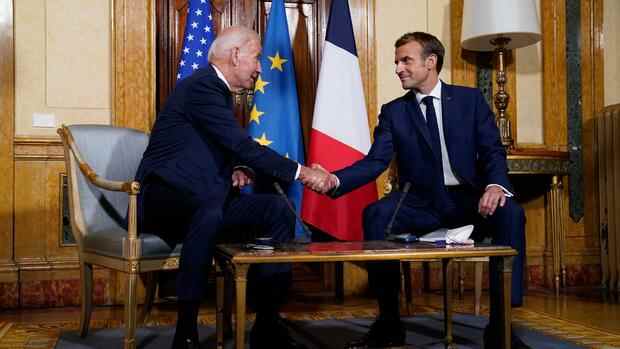After the French submarine deal with Australia failed, the mood between Washington and Paris was bad.
(Photo: dpa)
Paris Emmanuel Macron and Joe Biden were pursuing a clear goal in the run-up to the G20 summit in Rome: The presidents of France and the United States wanted to show the world that the two transatlantic allies had their diplomatic rift over the new American-British-Australian security alliance Have conquered the Pacific.
Macron didn’t mind that Biden’s arrival at the reconciliation meeting was delayed by more than an hour. The Catholic US President had an audience with the Pope beforehand, so delays in follow-up appointments can be tolerated.
Late on Friday afternoon, Biden and Macron were sitting in the Villa Bonaparte, the French embassy in the Vatican, and shaking hands. Although the US President did not deliver an official apology, he was sufficiently contrite: The new security alliance, which also ended a billion-dollar submarine deal between France and Australia, had been “clumsily” set up.
Incidentally, he assumed that France had known about the loss of the arms business for a long time, said Biden. “Honestly, by God”. Anyone who appeals to the Almighty after an audience with the Pope seems to be serious.
Top jobs of the day
Find the best jobs now and
be notified by email.
Macron said it was now about “that we look to the future”. Coordination and cooperation between the two countries must be strengthened. The French president was confident that lost trust could be rebuilt.
Joint statement
In this spirit, the White House and Elysee Palace released a bilateral statement on Friday night after the meeting. In it, the presidents reaffirmed their commitment to “closer bilateral and transatlantic cooperation”. At the same time, the US recognizes “the importance of a stronger and more effective European defense policy” as a complement to NATO. It was also important for the French to emphasize the need for “robust cooperation” between the US and the EU in the Indo-Pacific region with a view to the rise of China.
The question is what value the communiqué has in geopolitical practice in the end. How much will the United States actually take European sensitivities into account in the future, especially in the event of a worsening confrontation with China? In addition, the French dream of “strategic autonomy” for Europeans is also met with skepticism within the EU, especially in Eastern European member states.
Not only the US government was surprised in mid-September at the indignation with which France reacted to the new security pact. As part of the Aukus alliance, the US is providing the Australian allies with the technology for nuclear-powered submarines. Australia then terminated a contract with the French armaments company Naval for the construction of conventional submarines.
Macron was by no means viewing the affair as a shattered arms deal. In Paris one felt betrayed by close allies. In addition, after the unilateral withdrawal of the USA from Afghanistan, the French saw their view confirmed for the second time within a few months that the EU states should stand more on their own two feet in their security policy.
France withdrew the ambassador from Washington. Foreign Minister Jean-Yves Le Drian moved Biden closer to his predecessor Donald Trump: The rhetoric in Washington may have changed, the unilateral decision-making mode remained without regard to allies.
Biden and Macron already tried in a phone call at the end of September to smooth things over. The French ambassador is now back at his place of work in Washington. The meeting of the two presidents on neutral ground in Rome now marks a return to normality. US Vice President Kamala Harris is expected to visit Paris in ten days.
More: The stunted trillion package: Biden travels to Europe with a sham breakthrough
